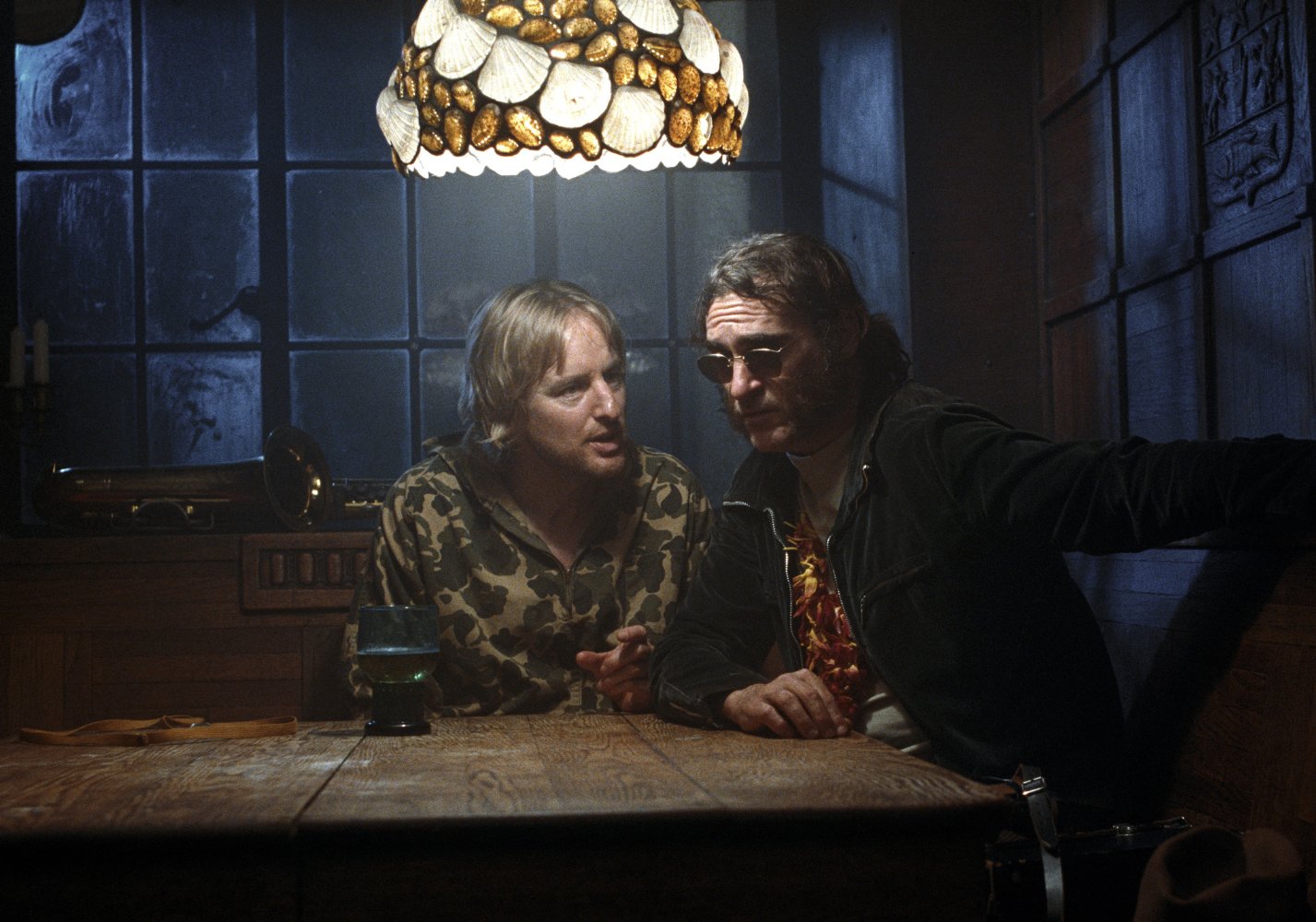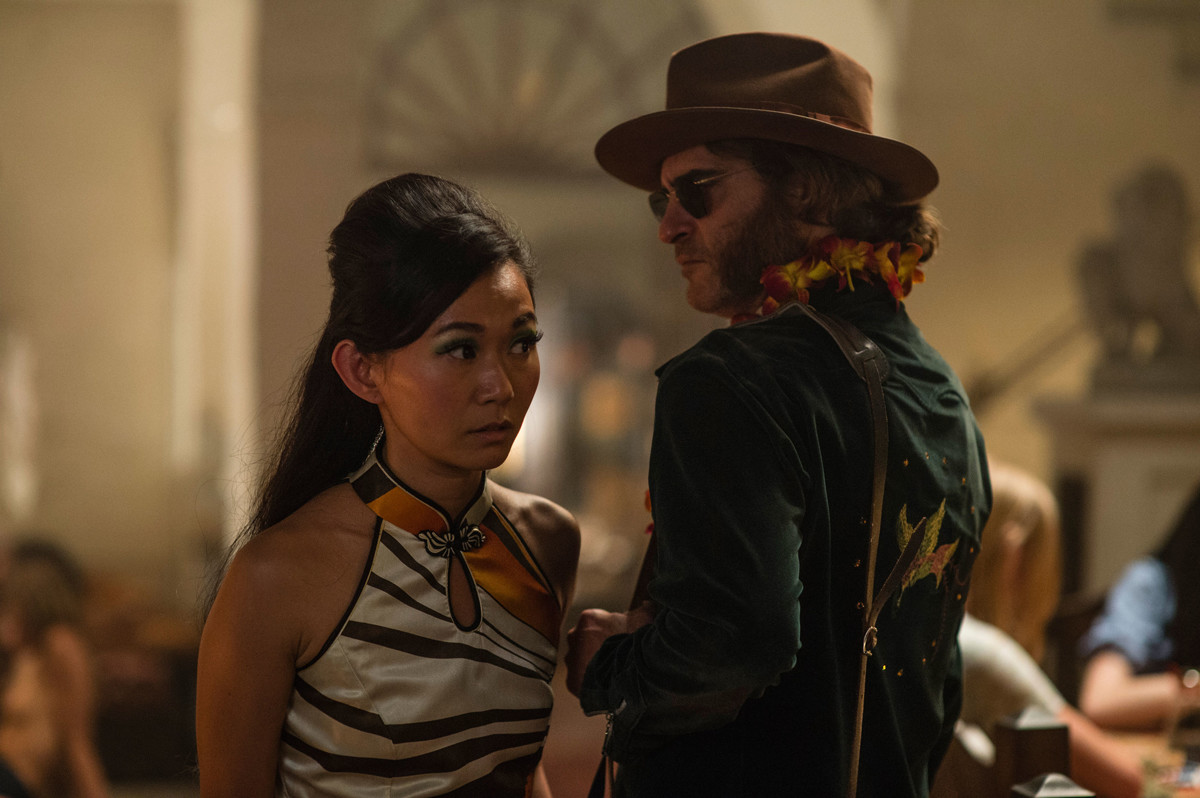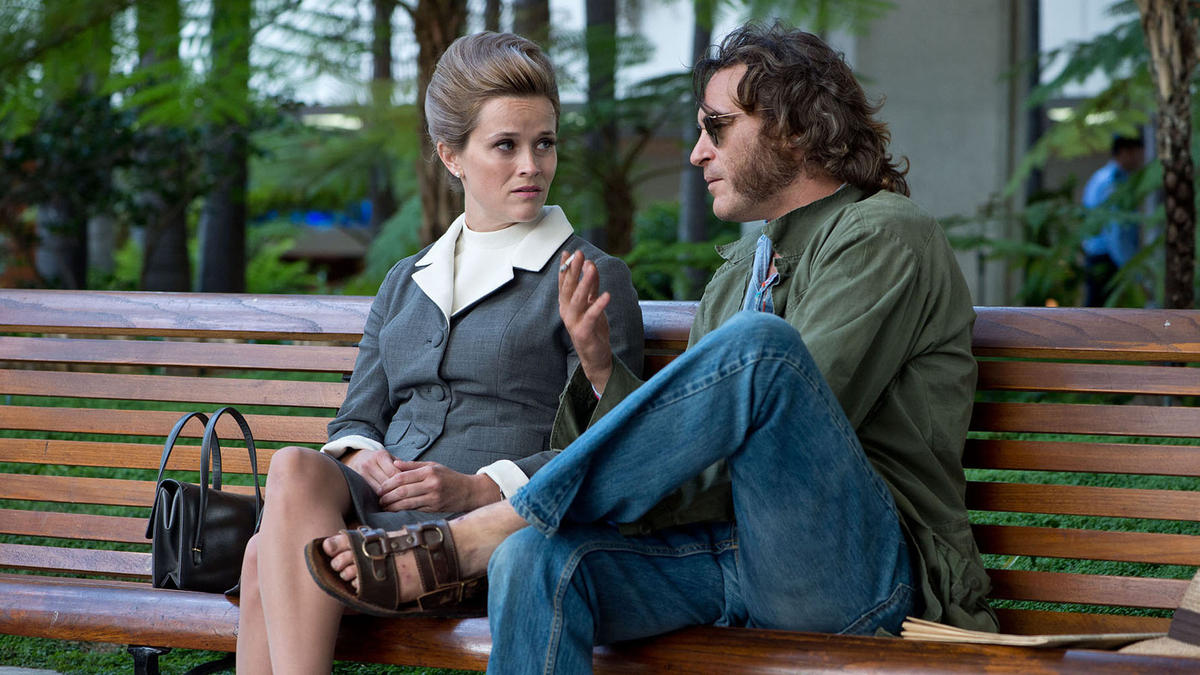
“I don’t know what I just saw.”
– “Doc” Sportello
“Inherent Vice” is the 2014 film by the wunderkind Paul Thomas Anderson; it is based on the novel of the same name by acclaimed postmodernist author Thomas Pynchon. Jean-François Lyotard famously defined postmodernism as an “incredulity towards metanarratives,” meaning that the narratives that gave meaning to political, ethical (etc.) concepts in the past are simply no longer credible.
In the New York Times article on Pynchon’s novel, the author says: “The private eyes of classic American noir dwell in a moral shadow land somewhere between order and anarchy, principle and pragmatism. They’re too unruly to be cops and too decent to be crooks, leaving them no natural allies on either side but attracting enemies from both.”
Pynchon is a writer who is “notoriously” reclusive; only a few photographs have been taken of him. He started publishing in the late 1950s and early 1960s and that fact is crucial for understanding “Inherent Vice”.
Anderson’s film follows that idea in the spirit of Pynchon’s novel; the film is not easily ‘digestible’, to say the least. The film seemingly follows the tradition of stoner films like “The Big Lebowski”, but it is also very different than that particular type of film.
When the viewer watches it, they should ask themselves: “Who can I ‘trust’?” The answer is – no one. Not the narrator, not the characters who even don’t trust themselves, not even the director who seems to ‘play’ with the viewer, making him believe what is not, and the other way around.
This may look stark, but it surely is not. It is what gives this film a spell-binding attraction, but also incurs the loss of popularity among the viewers. The film gained a rating of only 6.7/10 on IMDb. This article will try to present the arguments as to why this is unjustified.
1. “Omniscient Narrator”

The role of the omniscient narrator is given to Sortilège, a friend of Doc Sportello. In the history of literature, the omniscient narrator is primarily associated with the realist novelists (Turgenev, Stendhal, etc.) They are the one who presents the narration in an impartial way. It is obvious that Sortilège cannot be that kind of a narrator since she is personally connected to Doc. She seems to know his thoughts, but also provides social commentary.
The film opens with a beautiful shot of the sea and beach houses and we are told that the narration occurs in California in the 1970s. At the beginning, Sortilège says: “Back then it was always sandals, bottom half of a flower-print bikini and a faded Country Joe and the Fish T-shirt.”
It is important to note that she says “back then,” meaning that she is reminiscing about the time that had passed, the era of the hippie culture (flower-print bikini). “A faded Country Joe” implies the egalitarian nature of the movement. The narrator’s telling of the story as if it had passed implies that we are dealing with the time gone by that may have emotional value to the narrator, and the writer of the script/novel as well.
To entirely grasp the meaning of the film, a reference to the ending is necessary. Shasta says that the narrator (Sortilège) “knows things.” This reference is interesting since the character acknowledges the “omniscience” of another character. Sortilège says: “Yet there is no avoiding time. The sea of time. The sea of memory and forgetfulness. The years of promise gone and unrecoverable.
Of the land almost allowed to claim its better destiny only to have that claim jumped by evildoers known all too well and taken instead and held hostage to the future we must live in now, forever.” The narrator’s melancholy is amplified by the fading shots of characters who lived and laughed together, in an era that is gone.
She also says: “Was it possible that at every gathering, concert, peace rally, love-in, be-in, freak-in, here up north, back east, where ever, some dark crews had been busy all along reclaiming the music, the resistance to power, the sexual desire from epic to everyday? All they could sweep up for the ancient forces of greed and fear? Gee he thought… I don’t know.”
The most important part of this quote, which emphasizes the “ancient forces of greed and fear,” is in line with the tradition of the great American novelists William Faulkner, Herman Melville and Cormac McCarthy. For them, America is an evil soil; it was evil before the Europeans came, even before the Natives. The very name of the film “Inherent Vice” suggests that man is a being that is inherently evil.
Sortilège says: “’Inherent vice’ in a maritime insurance policy is anything that you can’t avoid.” The term “inherent vice” as described implies solidity, something definitive, in contrast to the hippie culture discourse of libertinage and freedom. It also implies the solidity of vice and the fleetness of virtue.
2. Conspiracy Theory Mechanisms

Author Nebojša Blanuša, who studies the psychological framework of conspiracy theories, writes that conspiracy theories are not (just) a form of political pathology but also a credible form of reasoning. In his famous 1961 speech, John F. Kennedy said: “We are opposed around the world by a monolithic and ruthless conspiracy.”
A great number of events simply could not be understood without the conspiracy theory apparatus. “Inherent Vice” falls into that category since the entire narration is presented as a grand conspiracy. Against whom is the grand question. Most likely against almost every character in the film. Conspiracies are part of their daily lives.
At one moment in the film the “end of Hollywood” is mentioned; this may be seen as a social commentary pointing to the contemporary times. In “Inherent Vice” the grand conspiracy revolves around the notorious “Golden Fang”; conspiracies are multidimensional. From policeman who tries to give away the Book of Mormon for free, to Owen Wilson’s character who works as a spy, he is the focal point that should be looked upon carefully when interpreting this film.
Drug dealers, the mob, the government, a place where Doc is offered a “Pussy Eater Special,” they are all connected to one “ruthless conspiracy,” as Kennedy states. These agents work as ‘autonomous’ beings, each pursuing their own interest. Nevertheless, the connections between characters, their aims, and motivations to act need to be examined carefully to fully comprehend “Inherent Vice”.
3. Deconstruction and Reconstruction of an Era

The film is set in 1970s, a turbulent time which also marks an end of an era, of a cultural movement associated with the hippie culture, beatniks and so on. The Manson murders, which are mentioned in the film, symbolize that end. This may remind of Faulkner’s work, whose constant motif is degeneration and decay. While in Faulkner’s work this decadence is associated with blood and heritage, Anderson focuses on the decay of a set of cultural beliefs and practices. The future seems bleak and uncertain.
At one moment in the film, the lawyer Penny says to “Doc” Sportello that he is a “dirty little hippie.” He jokingly accepts that designation, but at the end of the film he says: “Some hippie made that up.” It seems that he is suddenly rejecting his own identity; maybe the experiences that he has gone through have changed him, or maybe it’s just another joke at the viewer’s expense.
Hippie culture was closely connected to the protests against the Vietnam War and although this is rarely mentioned in the movie, it is a theme that hovers over the narration. With the end of the war at hand, hippies lost their “raison d’etre” and the movement was at an end.
Throughout the film, “Doc” often changes his identity (his hair, clothes etc.) and this means that he must be adaptable to survive; hippie culture surely adapted over time, but as in nature, those who cannot adapt in the best possible way – perish.
4. “Doc” Sportello’s Paranoia and his Relationship to “Bigfoot”

For psychoanalyst Jacques Lacan, all knowledge is imbued with paranoia. This may be an overstatement, but is surely in line with Lacan’s discourse; it is at the same time genius and megalomaniacal (he was a friend to the surrealists). Sportello seems to operate on such a level constantly and solves cases with the power of reasoning, which connects the unconnectable (“Bigfoot” considers them illogical, to say the least).
Traditional logic (Aristotelian to take an example, which relies on syllogisms) would condemn such form of reasoning, but it is a fact that Sportello solved the case in the end. He is paranoiac, that’s for sure; the steady use of drugs surely doesn’t ‘help’ with that. We can see that Sportello experiences hallucinations when he sees “Bigfoot”’s face on the television; it can be guessed that he is mildly obsessed with him.
“Bigfoot” had a partner, which he had lost, and his love-hate relationship with Sportello is one of the most interesting aspects of the film. In the end they smoke a joint together and behave as friends, while earlier they had a tumultuous relationship. When Sportello sees “Bigfoot” sucking on an ice cream, there are two possibilities, and both can be correct. Either “Bigfoot” has repressed homosexual desires or Sportello is hallucinating and he has them. This aspect of the movie is comic and adds another layer to it.
5. Leviathan and his “Subjects”

At one moment in the film, Japonica Fenway excitedly asks the policeman: “Are you the great Beast?” This allusion may be twofold. Thomas Hobbes in his “Leviathan” talks about a mortal god, Leviathan, which is, in fact, the state. But Hobbes also talks of Behemoth, a Biblical beast which represents disorder and anarchy. Japonica may have talked about both of them since the policemen can represent both the state and anarchy, in the mind of someone who is embedded into counter-establishment discourse.
We must remember that the context of the film is the Vietnam War, a war that the counterculture movement saw as barbaric, brutal and pointless. Leviathan demands the lives of young men and Behemoth’s rule commences. During the entire film, the state and those who represent it (Nixon, Reagan) hover above as a constant threat.
On the other hand, Leviathan is a Biblical beast that according to the Book of Job represents a powerful enemy – Babylon, seen by the Hebrews as a symbol of violence and corruption. Babylon is also a symbol of sexual libertinage and in that sense the hippie movement can be juxtaposed to that ancient kingdom.
In his song “Last Year’s Man”, Leonard Cohen writes: “I came upon a wedding that old families had contrived; Betlehem the bridegroom, Babylon the bride. Great Babylon was naked, oh she stood there trembling for me, and Betlehem inflamed us both, like the shy one at some orgy.” Cohen imagines Babylon stripping down for him, while he equates himself with Betlehem. Thus, chaotic violence is subdued.
When we put all these notions in the context of “Inherent Vice”, we can state that America is seen by Anderson as a land of great promises, but also at great risk for decadence.
6. Romance Turning into Power-Play

We can see that Sportello is infatuated with memories of his ex-girlfriend Shasta. They shared an experience which was carefree and they lived in the moment in happiness. During these romantic scenes in the film, red and blue colours appear. Red represents passion and emotion, while blue is an anticipation of sadness and melancholy. All of this turns bleak when power enters the story in the form of a wealthy businessman who turns her into one of his concubines.
We can see her stripping down to intimidate Sportello and manipulate him into believing that she is submitting to him, whereas it is the other way around (the sex scene in the end). This is symbolic in a hippie discourse manner since the unrestrained love is contrasted to the games of power. The power games motif has pessimistic overtones and is fully explored in Michael Haneke’s “La Pianiste”, a film that can be beautifully juxtaposed to the final scenes of “Inherent Vice”.
Author Bio: Hrvoje Galich is a student of political science and writes expressionist poetry. He believes that Tristan und Isolde is the most beautiful artistic piece in the history of man. He loves movies by Andrei Tarkovsky, Michelangelo Antonioni, Ingmar Bergman and Shohei Imamura. He adores his cat “Meow”, the only cat in the world that can say her name.